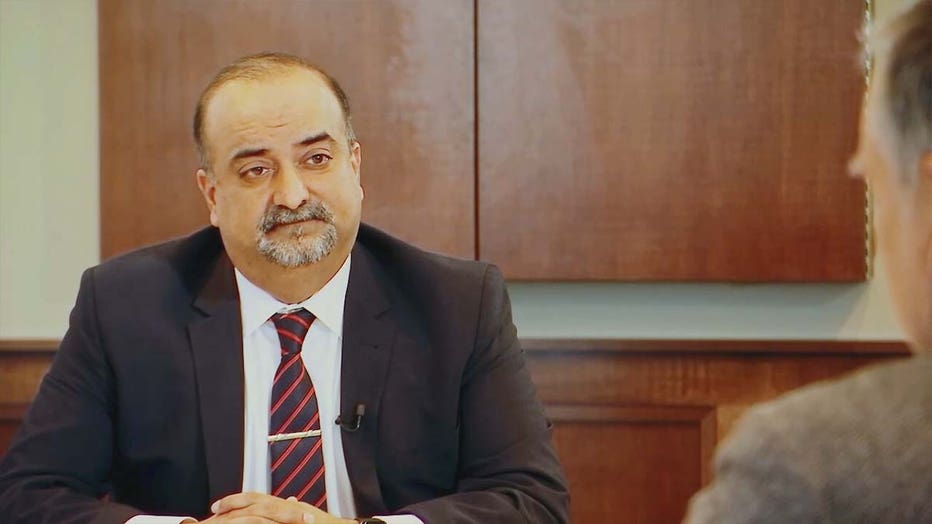Former Kim Potter Prosecutor: Early offer to discuss plea deal rebuffed

Former Kim Potter Prosecutor: Early offer to discuss plea deal rebuffed
Imran Ali is still getting hate mail, eight months after he stepped down as prosecutor in the case against former Brooklyn Center Police Officer Kim Potter.
(FOX 9) - Imran Ali is still getting hate mail, eight months after he stepped down as prosecutor in the case against former Brooklyn Center Police Officer Kim Potter.
"It’s difficult to watch, I guess, from the outside looking in," he said of the televised trial that ended in a jury convicting Potter of first-degree and second-degree manslaughter.
But it is not difficult for Ali to imagine a very different outcome if he had kept the case.
Shortly after he charged Potter with only second-degree manslaughter, he told her attorney, Earl Gray, they should talk about a potential plea deal.
"I said to him, ‘Hey, let’s sit down. I think this is a case that should resolve,’" Ali recounted to FOX 9, in what he said would be his final interview about the Potter case.
"And I was not met with, ‘Give me a moment. Let me, you know, look over things.’ I was met with a ‘No,’" he said.
Ali said it was the first time in his long career that he was summarily rebuffed by a defense attorney while offering to discuss a potential plea deal.
In hindsight, it was a missed opportunity to settle a controversial case quickly and for Potter to avoid any prison time.
Instead, Minnesota Attorney General Keith Ellison took over the case a month later, May 21, and upped the charges to include first-degree manslaughter.

Imran Ali, former prosecutor in Kim Potter's case, says he was rejected when he offered to talk about a potential plea deal.
Ali resigned from the Washington County Attorney’s Office a few days later, May 24, citing "the vitriol from some and the infusion of partisan politics by many."
Potter’s attorney, Earl Gray, has a different recollection.
"A defense lawyer with a brain would not discuss a plea deal without receiving any discovery," Gray said in a statement to FOX 9.
"I believe I told Ali that when he wanted to talk about a plea way before I received thousands of pages of reports," Gray said, referring to documents provided in the discovery process.
"Ali then quit. Ellison is a politician. His ‘team’ never made an offer but instead upped the ante to 1st degree and filed a Blakely notice. Dictated of course by his mob followers," Gray said.
Blakely is a notice that state prosecutors will seek a lengthier sentence for Potter based on aggravating circumstances.
Potter was convicted by a jury last month on both manslaughter charges and counts and will be sentenced February 18 on the singular charge of first-degree manslaughter. She faces a statutory maximum of 15 years in prison.

Potter was convicted by a jury last month on both manslaughter charges and counts and will be sentenced February 18. (FOX 9)
Under Minnesota sentencing guidelines, someone like Potter without a previous criminal history would normally face a presumptive sentence of seven years and would serve two-thirds of that sentence in prison.
Ali still believes probation is called for with Potter.
He still doesn’t believe the evidence shows she was committing a crime when she shot Daunte Wright (first-degree manslaughter), but he does believe it is ‘culpable negligence’ (second-degree manslaughter).
"It is subjective, prosecuting. You can pick and choose how the facts meet the law. And ultimately, 12 jurors disagreed with me," Ali said.
Ali said he felt there was an effort to intimidate, harass, and pressure him to add charges of murder or first- degree manslaughter. He refused and ultimately resigned.
Ali disputes speculation that pressure came from certain elected leaders. Specifically, he said neither Ellison nor Hennepin County Attorney Mike Freeman ever tried to influence him to change his charging decision.
What still stings, he said, is the vitriol directed at his boss, Washington County Attorney Pete Orput, who had protestors in front of his home at all hours. Orput recently announced his retirement.
Ali said the civil defense attorneys representing Daunte Wright’s family agreed with him about the charging decision of second-degree manslaughter but said two days later in front of the microphones it was a murder.
Public officials, who knew better he said, refused to set the record straight.
"The mayor of Brooklyn Center is making comments and tweets about removing us from the case, not even knowing who we are or what our experience is. All of that that played into it," Ali said.
It was all too much for Ali, who has been twice named Minnesota Attorney of the Year.
Ben Crump, and the civil team representing Daunte Wright’s family disagreed with Ali’s recollection.
"We view this as a biased mischaracterization of events by someone whose clientele is now law enforcement," the Crump team said in a statement to FOX 9.
"It has been disappointing, to say the least, to watch a prosecutor turn on the family he looked in the eye and promised to seek justice for," the statement said.
Now in private practice, Ali puts on legal seminars on the use of force for police departments. But he readily admits the political climate is also changing the legal landscape.
"I tell people every day I have faith in the system, and I have faith the right thing will be done," Ali said.
"But I do think that all of us need to take a pause and we really need to start looking at how are we treating officers in court differently then we're treating everybody else. And the answer to that is absolutely we are. And that's not right," he said.

